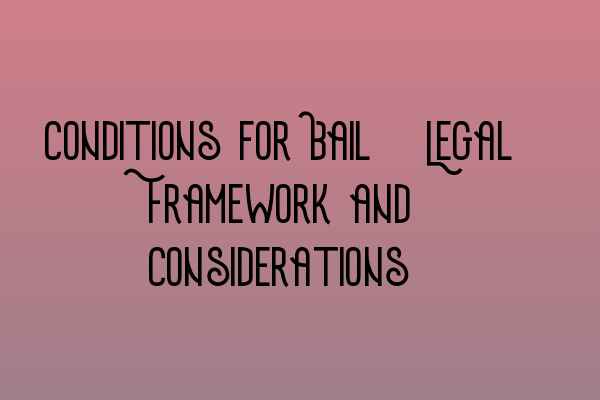Conditions for Bail: Legal Framework and Considerations
When facing criminal charges, one of the most crucial aspects is determining whether or not the accused should be granted bail. Bail ensures that individuals charged with criminal offenses can be temporarily released from custody pending their trial. The conditions for bail are defined by a legal framework that takes into account various factors and considerations.
The Legal Framework for Bail
English law provides a framework that guides the granting of bail and helps maintain a balance between the interests of justice and individual rights. The Bail Act 1976, amended by subsequent legislation, sets out the relevant provisions that govern the decision-making process. The courts have the discretion to grant bail unless certain circumstances arise, such as potential interference with witnesses or the risk of absconding.
Considerations for Granting Bail
Several factors are considered when determining whether an accused individual should be granted bail:
- The seriousness of the offense: The nature and severity of the alleged crime weigh heavily on the decision of granting bail. More serious offenses may lead to a higher likelihood of denial.
- Risk of flight: The court assesses whether the accused poses a risk of absconding, considering factors such as ties to the community, employment, family obligations, and previous criminal history.
- Public safety: If the court believes that releasing the accused may pose a threat to public safety, bail may be denied or specific conditions may be imposed, such as electronic monitoring or reporting to a police station.
- Witness interference: In cases where there is a risk of witness interference, the court may deny bail to prevent potential hindrance to the criminal justice process.
- Compliance with previous bail conditions: If the accused has previously breached bail conditions or failed to attend court appearances, it may negatively impact their ability to secure bail.
It is important to note that each case is unique, and the court carefully considers the specific circumstances before making a decision on bail. The primary goal is to ensure the accused’s appearance in court while minimizing potential risks to public safety and the integrity of the justice system.
Conclusion
The conditions for bail in the UK are governed by a legal framework that weighs various factors to make informed decisions. Understanding the legal framework and the considerations involved in granting bail is essential for anyone facing criminal charges. If you are preparing for the SQE examinations, it is crucial to familiarize yourself with these concepts to enhance your knowledge of criminal law and practice.
For further guidance and preparation materials, consider exploring our related articles:
- SQE 1 Practice Exam Questions
- SQE 1 Practice Mocks FLK1 FLK2
- SQE 2 Preparation Courses
- SQE 1 Preparation Courses
- SRA SQE Exam Dates
We hope this article has provided you with valuable insights into the conditions for bail. Remember to consult legal professionals for personalized advice based on your unique situation. Stay informed, stay protected.
